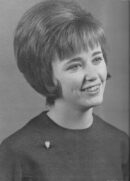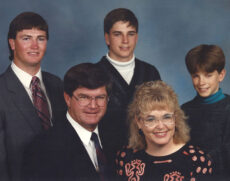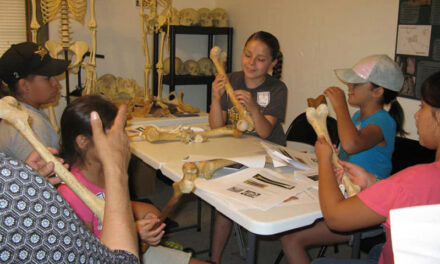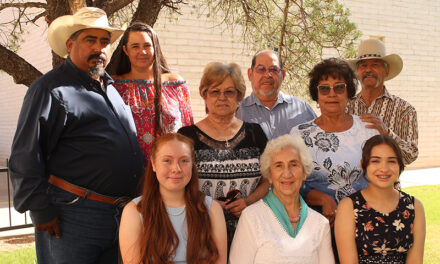Rex Henington and Sue Sharp were high school sweethearts. They dated from the time Rex was a junior and Sue was a sophomore.
Rex was a Belen Eagles football star, who went on to the University of New Mexico to play ball, major in biology and train for a career in coaching. Sue was an honor student and the Eagles’ head cheerleader. She was chosen the “Best All-Around” girl in her senior year.
Rex and Sue married six months after Sue graduated from Belen High School in 1965.

Sue Sharp’s 1965 Belen High School yearbook photo, six months prior to her marriage to Rex Henington.
Sue had always known that Rex wanted to coach but as a young bride, she had little idea about what that meant for him — or for her. Sure, her father, Dave Sharp, had been a basketball coach and she had learned a lot from her mother, Virginia Sharp. But until people actually do something, they don’t really know what they are getting into, for better or worse.
Sue certainly didn’t have a “how to” book or manual on how to be a coach’s wife. But looking back on her years with Rex, she could certainly write one now.
If she did, what she remembers about her career would include many of the lessons outlined in the following manual for beginners. The manual is a cautionary tale, but it is also filled with fun, adventure and marital bliss.
Lesson No. 1: The Hard-Working Coach
Sue would probably say that the toughest thing about being a coach’s wife was watching Rex work so hard. He worked day and night, watching game films, preparing for upcoming games and getting his players and assistant coaches ready from week to week.
Rex used any paper he could find to scribble down plays that came to mind. Sue had to make sure he didn’t use their best stationery when a play came to mind.
Ten- or 12-hour days were not unusual during the football season. Much of the work had to do with football, but much of it had to do with what we now call “human relations” or getting along not only with players, but also with administrators, teachers, parents and fans.
You might think this tough job is well compensated, but you would be wrong. No matter what their salary, putting in all those hours meant that coaches averaged about 23 cents an hour.
To help supplement the coach’s income, local school districts often offered part- or full-time jobs for the coaches’ wives. Sue worked in the Las Cruces public schools and in school libraries in Hobbs and Roswell.
When not employed in schools, Sue used her intelligence and skills at jobs in a dentist’s office, a Honda dealership, a sporting goods store and other interesting places. At home, she helped Rex by typing rosters, mending torn uniforms and sewing varsity letters onto sweaters and jackets. Sue often sewed letters on because dry cleaners charged more than a lot of players could afford.
Wanting players to pay for her work, Sue charged a Coke for each letter she sewed on. She could really have turned a profit if she had owned stocks in the Coca-Cola Company in those days.
Sue sometimes cooked for Rex’s teams. In one instance, unbeknownst to her, Rex promised his defensive squad that if they held their opponents scoreless in the next game, Sue would make them a big Mexican dinner. The team did its job and Sue helped Rex keep his promise.
We must wonder who had the toughest job: the players who won the game or Sue who fed a whole team of large teenage football players?
Given these conditions, a coach’s wife must get used to being alone, being a Jane-of-All-Trades, raising her kids largely on her own and managing a pretty small income to cover all household expenses. In preparation for these responsibilities, advanced courses in psychology, child development, home economics and accounting are highly recommended.
Lesson No. 2: A Gypsy’s Life
When marrying a coach in any sport don’t think for a moment that he or she is going to find a job and settle down in a single community where you can make a lot of friends, raise your kids and pursue your own career for very long. Some coaches are fortunate to have such longevity, but there are always other coaching opportunities on the horizon.
Rex started coaching at Goddard High School at age 22, right after he graduated from UNM in 1968. The Heningtons moved to Goddard but a year later, he was offered an assistant coach’s job in Clovis. They stayed in Clovis for four years before heading to Las Cruces and so on and so on and so on.
Their average residence in a town was 3.5 years. Rex had so many head coaching jobs (seven) that Sue has made a spread sheet to remind herself of all the high schools and the years he coached there. The list includes not only Goddard and Clovis, but also Hobbs, Roswell, Belen and Las Cruces (three times). Only military families move this often.
Coaches’ wives are also like gypsies because many, like Sue, attend all their spouses’ games, in extreme hot and cold, both home and away. She often traveled with other coaches’ wives or, once, on the team bus. Sue says she only missed a few of Rex’s games, and that was when she was about to give birth to their three boys, Jeff, Brian and Greg.

Rex and Sue Henington with their three sons, Jeff, Brian and Greg, 1990.
Photos courtesy of Sue Henington
Always the cheerleader she had been in high school, Sue often wore the school colors of whatever team Rex was coaching. Watching from the stands, Sue saw Rex send in plays using a system of hand signals. He had learned many of these hand signals while working for the railroad during his summer breaks in high school and college.
Not familiar with railroad signals, opposing teams never knew what plays Rex sent in to his teams. Neither did Sue. During one early game in Rex’s career, Sue kept seeing Rex rub his arm across his nose. Thinking that he had a runny nose, Sue brought him a tissue. It was probably the only time in football history that a coach’s wife ever called an “injury timeout” for her husband.
A picture in the Las Cruces Sun-News showed Sue shading her eyes from the sun while holding her son, Brian, in the midst of 10,000 cheering fans on Thanksgiving Day, 1975. According to the picture’s caption, Sue “followed each play seriously, dividing her attention between the game and her 2-year-old son.”
Rex’s Las Cruces High School Bulldogs won the game against Del Norte High, 27-0.
This means that a coach’s spouse should be willing to travel long distances, often back and forth from her home to away games in a single day. It also means that she needed to know a lot of geography in the days long before GPS or Google Maps. At the start of each away game, Rex always made sure he spotted Sue in the stands so he knew she had made the trip safely.
There are several advantages to all this travel. You definitely see much of our beautiful state. And, if your vehicle should break down, you usually know the coaches in nearby towns so you can call them for assistance. AAA membership is suggested in case you don’t happen to know the local coaches or they happen to be out-of-town at away games. In preparation for all this time on the road, a course in auto mechanics is suggested.
Lesson No. 3: Grow a Really Thick Skin
Sue developed some wonderful friendships and got to meet some terrific players and their parents, coaches and their families and football fans in general.
But for every 100 good people Rex and Sue encountered, there were always a few folks who could be hateful, especially with their crude remarks and impolite gestures in the stands. Although Sue could name many of these annoying people, she is a very kind person and so will only describe a few unfortunate examples.
Most people who criticize coaches are disgruntled because they are convinced their sons or favorite players aren’t getting enough playing time on the football field. You would think that only the coaches would hear these complaints, but their spouses often get an earful, too.
A member of the booster club in Hobbs chewed Sue out because she felt her son was not getting much time in the games. Sue put the woman in her place by telling her, “I sleep with the coach and my son’s not playing!”
Sue remembers another time when Rex did not play a really good quarterback for a game in Clovis. An upset woman called Sue at home and suggested that the fellow had been benched because he was black. Sue tried to calm the woman down by explaining to her that the quarterback was not playing because he had been injured and the doctor wouldn’t let him play. The player recovered and did so well that he went on to play college football.
Some towns were more racist than others. A certain community in the far southeastern corner of the state was the worst. Sue remembers that some of her white neighbors in that town complained when any of Rex’s black players came through their neighborhood to visit the Henington’s home.
On another occasion, Rex and Sue’s son, Brian, was walking with a black player named Damien after dark in that same southeastern town. The police stopped the boys and asked Damien why he was out at night. They never questioned Brian.
There are still many “sundown towns” in which blacks are warned to never be seen after sundown or face questioning and possible arrest. Sue hadn’t realized that New Mexico had any of these racist communities until that sad incident.
Fans who go to football games were usually polite and orderly, but there were exceptions. Unfortunately, adults and kids were known to yell cruel remarks against coaches and players during games. Sue learned early on that the best thing she could do was just let such incidents go. But she had limits.
At one game, she remembers a man sitting in front of her who was so obnoxious that Sue actually punched him in the back. The man didn’t turn around, but Sue wisely moved to sit in another part of the stands.
The ultimate insult occurred in that same southeastern town that had displayed so much racism before. Not pleased by the way Rex was coaching the town’s high school team, someone had placed a for sale sign in the Heningtons’ front yard. When Sue saw it, she was so upset that she pulled the sign out of the ground and brought it inside. When Sue told Rex about the incident, he just laughed and put the sign back up. The Heningtons moved to El Paso the following year.
This is an important lesson in Sue’s manual. Coaches and their spouses play very public roles and are vulnerable to both reasonable and unreasonable public demands. It’s good to have a thick skin, be a good sportsperson and respond to criticism as congenially as possible. It’s also good to establish limits and know when enough is enough and realize when it is time to move on.
In preparation for all this, advanced courses in interpersonal relations and conflict management are required.
Lesson No. 4: Facing Wins and Losses
Coaching any sport at any level is an occupation with many peaks and valleys. Rex’s highest peak was when his undefeated Las Cruces High team won the New Mexico AAAA state championship in 1975, beating the Eldorado Eagles, 29-15, at Wilson Stadium in Albuquerque.
It was Rex’s first year coaching the Bulldogs and, although he had many of the same players, he turned one of the worst teams in the state into the best. The Eagles had won the championship in 1974, while the Bulldogs had not played in a championship game in 16 years.
Newspapers called the Bulldogs’ success “one of the most dramatic sports stories in the history of New Mexico.” Many called it a miracle.
Rex motivated his players with inspirational leadership. Sue remembers Rex developed the habit of starting each fourth quarter by raising his hand, showing four fingers.
The players knew this was their last chance to play as hard as they could to win. The players wanted to win for themselves, their schools, their towns and their respected coaches. Coaches raising four fingers at the start of the last quarter became a tradition in New Mexico high school football. Younger coaches probably don’t realize that in making this gesture they are not only motivating their teams, but also honoring Rex.
Sue says that one of Rex’s toughest losses came when he was coaching the Hobbs Eagles and lost to the Clovis Wildcats, 56-8 in 1991. The result was hard enough to deal with, but the Wildcats poured salt into open wounds by intentionally running up the score once their victory was assured.
Rex’s hardest defeat came in 1982 while he coached in Belen. Although the Eagles and the Carlsbad Cavemen had better records than many Albuquerque teams, the two teams were not chosen for the playoffs.
Rex and the Carlsbad coach, David Church, appealed the ruling and their teams were allowed to play each other in a final game on Sunday afternoon, Nov. 21, 1982. When Rex called from Santa Fe with the decision, Belen High School’s principal, Ron Hodges, let Sue announce the good news to the waiting Eagle team. The players were ecstatic.
The big game was played at home in Belen. Sue remembers that the stands were packed with excited fans. Despite all the excitement, Belen lost to Carlsbad, 36-15. As with every game he ever lost, the loss broke Rex’s heart. As with every game Rex’s teams lost, Sue cried.

Sue and Rex Henington’s last family trip in 2007 to Pagosa Springs, Colo., before Rex’s passing.
The lesson is that sports, like the rest of our lives, may take many unexpected turns. Rejoice in the good times, but realize that they may not last. In fact, more lessons can be learned through defeat than through victory.
No one wants defeat, but victories would never be as sweet if they were all we knew. In preparation for all this patience and wisdom, a course in Realism 101 is highly recommended.
Lesson No. 5: Treasure Every Moment
Rex Henington coached New Mexico high school football teams for 21 years, 1968-94, both as a head coach and as an assistant coach, with a few breaks as an assistant principal and athletics director.
With more than 75 wins, Rex was proud of his record but would be the first to tell you that none of his success would have been possible without Sue. From the beginning to the end of his great career, she supported him, encouraged him and loved him every step of the way. And Rex did the same for Sue.
All those required and suggested courses in Sue’s manual are important, but they are useless unless a couple is truly blessed with a beautiful marriage like theirs.
Sue can’t imagine any other lifestyle for her. As she puts it with heartfelt gratitude, “Doctor’s wife? Nope. Lawyer’s wife? Nope. Any other wife? Nope. Coach’s wife? YUP!”
We should each be as pleased with our chosen spouse and path in life.
(La Historia del Rio Abajo is a regular column about Valencia County history written by members of the Valencia County Historical Society since 1998.
Opinions expressed in this and all columns of La Historia del Rio Abajo are the author’s alone and not necessarily those of the Valencia County Historical Society or any other group or individual.)

Richard Melzer, guest columnist
Richard Melzer, Ph.D., is a retired history professor who taught at The University of New Mexico–Valencia campus for more than 35 years. He has served on the board of directors of the Valencia County Historical Society for 30 years; he has served as the society’s president several times.
He has written many books and articles about New Mexico history, including many works on Valencia County, his favorite topic. His newest book, a biography of Casey Luna, was published in the spring of 2021.
Those interested in joining the Valencia County Historical Society should contact Dr. Melzer at [email protected].
















